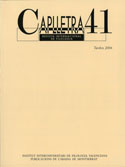Sobre alguns contrastos fonològics en l'entonació del català
DOI:
https://doi.org/10.7203/caplletra.41.4828Paraules clau:
Intonation, Categorial Perception, Tonal Contrast, Tonal Alienation Contrast, Tonal Height Contrast Resum
Resum
The main goal of this article is to provide evidence in favor of the phonological character of some intonational contrasts in Catalan. First, the article shows that tonal alignment differences with respect to metrically strong positions are crucial for the distinction between a yes-no question and a wh-question (cf. "¿Que l’ha llogada?" vs. "¿Qui l’ha llogada?") and between a command and a request ("¡Vine!" vs. "¡Vine!") in Central Catalan. Second, the article reports the major results from the application of the Categorical Perception Paradigm to a pitch height contrast in Majorcan Catalan
(Vanrell 2006a). Experimental resuls show that a small variation in the pitch height of the pretonic syllable is an important perceptual cue in distinguishing yes-no questions from wh-questions in this dialect ("¿Que l’hi duries?" vs. "¿Què li duries?"). The Catalan data demonstrate that small phonetic changes in pitch alignment and pitch scaling can be
crucial in the perception of intonation contours. Crucially, the data call for a revision of the autosegmental-metrical (AM) model of intonation: while the AM model predicts that differences in tonal alignment have the potential of creating phonological contrasts, it does not allow for phonological differences in pitch range.
 Descàrregues
Descàrregues
Descàrregues
Publicades
Com citar
-
Resum471
-
PDF106
Número
Secció
Llicència
L’autor o autora que adrece un treball a la redacció de Caplletra perquè siga publicat ha de ser la persona titular legítima dels drets d'explotació. La legitimació per a la publicació del treball ha d’incloure també les imatges, les taules, els gràfics i altres materials que puguen complementar el text, amb independència de si n'és l'autor o autora.
Copyright. Quan publica el treball en la revista, l'autor o autora cedeix a Caplletra. Revista Internacional de Filologia els drets d'explotació (reproducció, distribució i comunicació pública), tant per a l'edició impresa en paper com per a la versió electrònica, que serà accessible mitjançant la xarxa Internet.
Tots els treballs publicats en Caplletra es troben sota una llicència Creative Commons del tipus Reconeixement-NoComercial-SenseObraDerivada 4.0.
RESPONSABILITAT
Caplletra. Revista Internacional de Filologia no s'identifica necessàriament amb els punts de vista mantinguts en els treballs que publica.
Caplletra. Revista Internacional de Filologia declina tota responsabilitat derivada de qualsevol vulneració eventual dels drets de propietat intel·lectual que poguera ser duta a terme pels autors o autores.






